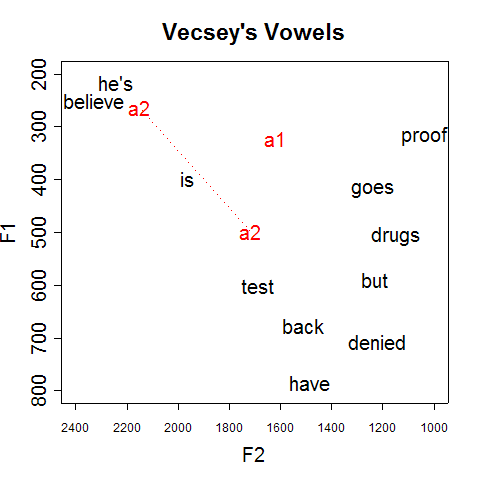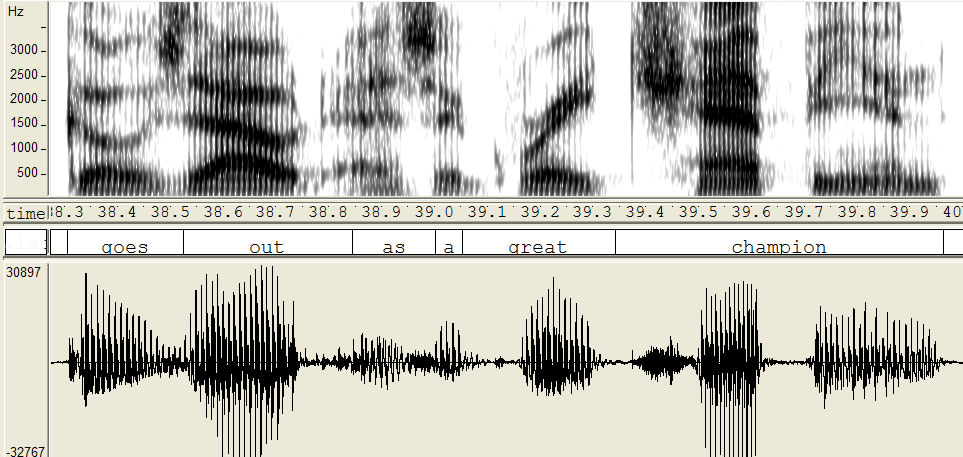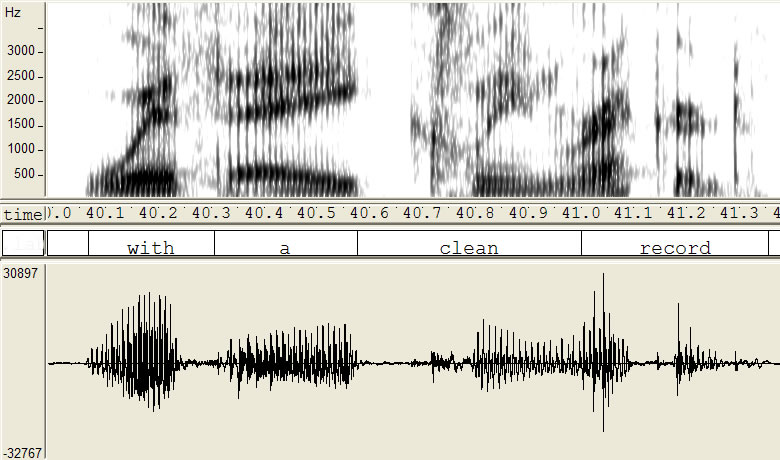July 25, 2005
The phonetic poetics of "a"
In this morning's online New York Times, George Vecsey narrates an "audio slide show" headlined Armstrong: the Legend. In the middle of Vecsey's narration, the following phrase occurs: "...he goes out as a great champion with a clean record." This is Language Log, not Cycling Log, so listen to Vecsey say this phrase , and see if you can hear what the linguistic issue is. Below, I'll explain the point visually as well.
Vecsey's context, of course, is a discussion of doping allegations. But our context here is the contrasting treatment of the two occurrences of the indefinite article a: "a great champion with a clean record". And I warn you that we're going to get deep down into it. If you don't enjoy mucking around in the tangled phonetic roots of communication, just move right along to another of our many fine posts.
As I'll explain, it's pretty clear what Vecsey is doing, in a physical sense, but there's room for interpretation in deciding what his phonetic performance means.
Here are waveform and spectrogram plots of the first subphrase "goes out as a great champion". Time runs from left to right: the waveform display below the transcription shows air pressure as a function of time, while in the spectrogram display above the transcription, the vertical axis shows frequency, and the degree of blackness shows the intensity of sound at a given frequency and time. (Click on the picture to hear the corresponding audio.)
As usual, the pronunciation of this a is quite short: the open portion of the vowel, from the start of voicing after the (devoiced) final [s] of "as" to the closure of the [g] in "great", is just 56 milliseconds. The vowel has a non-descript mid-central quality, mostly determined by assimilation to its context.
The situation is different for the a of "a clean record":
Here the open portion of vowel, from the start of voicing after the [th] of "with" to the closure of the [k] in "clean" is of 267 msec. , or almost five times longer. And the vowel quality is the full "long a" sound, roughly IPA [ej] .
We can place this trajectory on a two-dimensional plot showing the frequency of the first two resonances of Mr. Vecsey's vocal tract, sampling (the main-stressed vowels of) some of the words that he uses elsewhere in his voice-over:

I've used a formant-tracking program to measure the resonances, and tried to chose a characteristic point in the nucleus of each vowel. The results are plotted in the traditional way, with the second formant on the horizontal axis and the first formant on the vertical axis, both plotted so that the origin is (in effect) in the upper right-hand corner. The result is a space analogous to the IPA vowel chart, with fronter vowels to the left and backer vowels to the right, and lower (i.e. more open) vowels lower on the page than higher vowels.
Vecsey's first a is plotted as "a1", indeed a nondescript upper-mid central vowel. The trajectory of his second a is plotted as "a2", moving from a start just a bit higher and fronter than "test"(as it should be for IPA [e]), to an end just a bit lower and backer than "he's" and "believe", appropriate for an IPA [j] as an off-glide.
If you listen to Vecsey's phrase, it may sound to you (as it does to me) as if he pauses very briefly between "a" and "clean". In fact, there isn't really any physical silent pause -- the closure of the [k] in "clean" is only about 94 msec. long, which is not unusually long for the stop gap of a [k] before a stressed vowel. (Thus earlier in the voice-over, Vecsey says "...until I heard that he had cancer", with a stop gap of about 104 msec for the initial [k] of "cancer".) Instead, what's between "a" and "clean" is a "pseudo-pause" -- an extra bit of time into which the previous sound extends itself, the extra 200-odd milliseconds of "a".
But that isn't the only thing that's going on phonetically. There's also the fact that the vowel of the "a" is fully realized rather than reduced. And if you look at the spectrogram shown above, you'll also see some darker and more widely spaced vertical striations at the very start of the "a". These vertical striations show the individual pulses of glottal vibration. For an instant, Vecsey's pitch plummets. He ended "with" at about 102 hz., corresponding to a period of about 10 msec.; he starts "a" at about 42 hz., with a period of only about 2.4 msec., though he's back up to 91 hz. within a tenth of a second. This brief disruption of the pitch is a sign of some kind of glottal stricture, short of a full glottal stop. You hear it as a slightly rough onset to the vowel. In American English, this kind of glottalization is often a sign of juncture.
So what's going on here? I might add that Vecsey's 4-minute voice-over contains 25 intances of pre-consonantal a, and 24 of them work just like the example in the first phrase ("a great champion").
As discussed in previous posts, the usual pattern in English is for the indefinite article, when unstressed and preceding a word starting with a consonant, to be pronounced as a short reduced mid-central vowel. Of course the isolation, citation-form pronunciation is something like IPA [ej] (details depending on dialect), just like the prounciation of the first letter of the alphabet. And under contrastive stress, the same full, unreduced pronunciation emerges, as in a phrase such as "Not the reason, but a reason".
However, from time to time, non-contrastive instances of unreduced a are also found. In an earlier post, I observed that in President Bush's speech nominating John Roberts, 6 out of 26 instances of fluent pre-consonantal "a" were unreduced. Chris Waigl, looking at a speech by Ed Felten, found 1 out of 31 fluent pre-consonantal a's to be unreduced. We might suppose that Vecsey's usage is basically the same as these other two cases, frequency of occurrence aside.
I'm not sure, though. Bush's six unreduced preconsonantal a's don't sound to me as as if they precede pauses, pseudo- or otherwise -- though of course this sort of subjective judgment is often wrong. Listen for yourself and see what you think. I have the same impression of Ed Felten's unreduced pre-consonantal a, which occurs in the phrase "My third example comes from a question that Barbara Sarmonds asked yesterday". (Though Felten does seem to pause between "from" and "a"...)
I think something is going on in the Vecsey example for which the (pseudo-)pause following a is crucial.
Phrase-final instances of a are often given the unreduced pronuncation, even when they're not emphatic. This often happens in the case of disfluency or self-correction: when someone pauses because they're not sure what to say next, or gives up on a phrase after saying "a" and restarts from an earlier point. For example, in the Bush nomination speech previously discussed, at one point the president says:
Before he was a-
before he was a respected judge, he was known as one of the most distinguished
and talented attorneys in America.
The prepausal a is unreduced, even though its repetition in the phrase "a respected judge" is reduced as expected.
And as I said, I hear a hesitation in Vecsey's phrase, realized phonetically as a pseudopausal extension of the a. But why is it there? Was he uncertain for an instant of what to say next? Did he almost make a speech error?
I doubt it. The line "he goes out as a great champion with a clean record" sounds like one of the things that Vecsey worked out in advance, and even rehearsed. Instead, I think that he's using this little pauselet to emphasize "clean record", not by making it louder or higher in pitch (which it isn't), but by setting it off with a tiny little bit of extra space. The elevation of a to the status of a full word then follows from the decision to create this juncture.
Here's a full transcript of Vecsey's remarks on doping, so that you can see the rhetorical context:
The other side of Armstrong's career is ((that)) he raced for several years in Europe, in France,
with French officials and journalists trying to find specific proof that he might have used illegal drugs:
he denied it,
uh he's never been penalized, never had a positive test in legal terms,
so he can say he's the most tested athlete in the world, and he is, the fact that the French just don't believe
that an American, that somebody could have cancer and come back and win the Tour de France,
and he does have his critics,
but
all I can say is that there's no proof --
whatever he's doing, he's still beating all these other people by five minutes
and
as far as I'm concerned, he goes out as a great champion
with a clean record
This emphasis-by-juncture isn't a brilliant rhetorical innovation on Vecsey's part. It's in the standard repertoire of rhetorical performance in English. Vecsey uses it well -- if I'm right that he's using it -- but in any case he didn't invent it.
Now we need to ask whether the unreduced a's without noticeable juncture, previously noted in speeches by W, by Ed Felten and by FDR, are examples of the same phenomenon, or are something different. My guess is that these are a different sort of thing; but I could be wrong. Perhaps they all involve a covert juncture of some sort, whose interpretation might variously be emphasis, care in speaking, or compositional difficulties. In other words, either extra certainty or extra uncertainty about the message.
This requires further research, in Vladimir Nabokov's words, combining "the precision of poetry and the excitement of pure science".
Posted by Mark Liberman at July 25, 2005 04:12 PM
